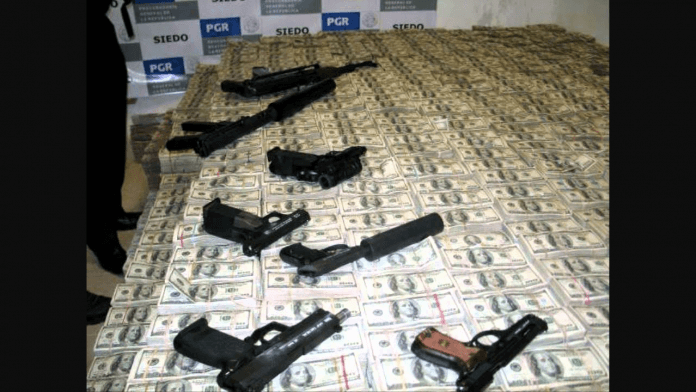Narcotic Control Bureau (NCB), the central agency which is supposed to generate intelligence on illegal drug trade is facing a severe manpower crisis.
By Kunal Chatterjee
There have been at least 73 arrests in India and confiscation of more than 1000 kgs of banned substance over the last month by the different security agencies around the country. The smuggling of narcotics is on the rise in India, and Mumbai, Delhi and Kolkata, apart from Arabian Sea and Bay of Bengal, have become major transit routes for the international illegal drug trade. But our Narcotic Control Bureau (NCB) does not have enough men to take on the drug cartels and sever their supply lines.
Established on March 17, 1986, the NCB today is desperately seeking to hire around 100 junior intelligence officers to improve its operations. Over the past year, it has made at least 10 attempts to hire officers, but without much success, sources in the agency admitted to Aseema.
On October 11, 2018, the Bureau announced plans to hire 166 Junior Intelligence Officer on a deputation basis. The basic eligibility for applicants was having six years of service in their parent cadre and the NCB stated that the selected candidates would be posted anywhere in India.
“The task of junior intelligence officers is to ensure enforcement of the Narcotic Drugs and Psychotropic Substances Act through collection and development of intelligence, investigation as well as search, seize and arrest. “A junior intelligence officer would also have to look after trials in the courts, coordinate with other drug law enforcement agencies and carry out works assigned or allocated by his superior officers,” says a source in the agency.
With almost nil response from officials in Central or state governments, the NCB on November 30, 2018, carried a corrigendum extending the last date of application. Again on January 3, 2019, it extended the last date of application up to January 28, 2019. “But again there was no response,” says our agency source.
On January 30, 2019, the Bureau extended the last date of application to February 27, 2019. It again issued a corrigendum on March 1 and extended the last date of application till the end of the month. However, failing to get a good response even then, the Bureau closed the application process.
On April 2 this year, the NCB again advertised to hire 115 junior intelligence officers and failing to get a response, extended the last date of receipt of application till July 1. On June 28, the Bureau further extended the last date till July 31. The reason was the same. No response.
On July 31 this year, the Bureau issued a fresh application to hire 109 junior intelligence officers on a deputation basis. The NCB again got a lukewarm response.
So on August 22, the Bureau drafted rules for direct recruitment of junior intelligence officers. There are 195 posts of junior intelligence officers out of which 60 per cent would be hired by direct recruitment when the agency fails to get men on deputation.
The 195 posts of junior intelligence officer were created in 2017. And as per the recruitment rules for a junior intelligence officer, 25 per cent would hire be on deputation and 15 per cent through Limited Departmental Competitive Examination.
A senior Union Home Ministry officer said the NCB recruitment rules provide that posts from sepoy to deputy director and zonal director be filled through deputation, promotion or direct recruitment.
“Direct recruitments are made for an intelligence officer, assistant, operator telecommunication, stenographer grade III, upper division clerk, lower division clerk, surveillance assistant, sepoy and multi-tasking staff and these may be treated as cadre posts of the NCB,” an officer from NCB notes.
Currently, the anti-drug law enforcement agency is working on 60 per cent of its total strength of 889 personnel. It has a cadre strength of around 330 personnel, while the rest of its staff is on deputation.
According to NCB, international drug cartels are slowly establishing a base in India. It is apparent from the increase in the number of foreign nationals arrested for drug trafficking in the country. A total of 219 foreign nationals were arrested for drug trafficking in 2016, and the number jumped to 397 in 2017. Those arrested included nationals from Germany, Russia, the United Kingdom and other countries.
According to the NCB, a total of 38,975 drug traffickers were arrested and 31,535 cases registered under the Narcotic Drugs and Psychotropic Substances Act in 2016. In 2017, some 56,006 drug traffickers were arrested and the number of cases registered increased to 47,344.
The size of the seizures has also increased over the years. While a total 2,94,347.38 kg of ganja, 2,805.49 kg of hashish, 1,675 kg of heroin and 2,251.16 kg of opium were seized in 2016; a total 3,52,539.53 kg of ganja, 3,217.75 kg of hashish, 2,146.47 kg of heroin and 2,551.11 kg of opium were seized in 2017.
“The NCB is making attempts to strengthen its capacity and capabilities to combat illicit trafficking of narcotic drugs that are fuelling terrorism on the Indian soil. But strengthening manpower has become a major issue,” said a senior IPS officer, who had served in the Bureau.
Meanwhile, the threats are only increasing. An Intelligence Bureau (IB) dossier on narco-terrorism reveals that Pakistan’s drug industry has also grown in recent years, and its Inter-Services Intelligence (ISI) is now pushing more narcotics into India and the rest of the world.
IB officials say that the ISI probably has one of the best drug-smuggling networks in the world, and a smooth flow of narcotics across its network has its fallout not just in India, but also in the United States of America, Nairobi and Thailand among other nations.
A senior officer disclosed that trafficking of drugs from southwest Asia into India is already gaining ground. Also peddling other controlled substances as well as pharmaceutical preparations and prescription drugs containing psychotropic substances is an activity that is on the rise. To tackle these, India needs a strong anti-drug law enforcement agency.
The Bureau is currently headed by IPS officer Rakesh Asthana, who is making several attempts to revamp it.
Earlier this year, Minister of State for Home Affairs G. Kishan Reddy said the government has set up a Narco Co-ordination Centre (NCORD) under the Director-General of NCB to provide a common platform for concerted actions by all the drug law enforcement agencies and other stakeholders.
He also said that joint efforts were being made with neighbouring countries to check drug trafficking like increased international cooperation “for exchange of information and investigative assistance and sharing real-time information and coordination of operations with nodal agencies of neighbouring countries”.
The minister disclosed that India has signed bilateral agreements on drug-related matters with Pakistan, Nepal, Myanmar, Bhutan, Bangladesh, Sri Lanka, China and Afghanistan and agency-level talks are held regularly between the nodal drug law enforcement agencies of neighbouring countries like Bangladesh, Afghanistan, Myanmar and Sri Lanka.
He claimed that that the government had taken steps for intensive preventive and interdiction efforts along known drug routes; strict surveillance and enforcement at import and export points; increased international cooperation for exchange of information and investigative assistance in administering control over the movement of narcotic drugs and psychotropic substances. The government is also tracking precursor chemicals and has training programs for law enforcement officials for upgrading their skills to combat drug menace. It is also providing financial assistance to eligible states for strengthening their anti-narcotics units.
However, setting up of a robust narco intelligence gathering mechanism in the NCB remains a distant dream with around 100 posts of intelligence personnel still lying vacant.








